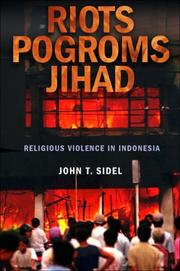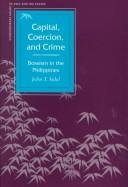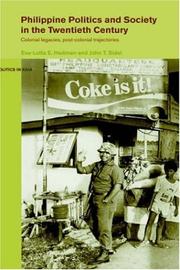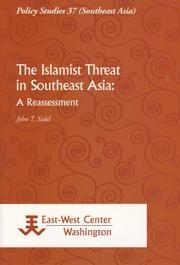| Listing 1 - 6 of 6 |
Sort by
|

ISBN: 9780801473272 9780801445156 0801445159 0801473276 Year: 2006 Publisher: Ithaca (N.Y.) Cornell University Press
Abstract | Keywords | Export | Availability | Bookmark
 Loading...
Loading...Choose an application
- Reference Manager
- EndNote
- RefWorks (Direct export to RefWorks)
Ethnic conflict --- Islam and politics --- Islam --- Religion and politics --- Terrorism --- Violence --- Religious aspects --- Islam. --- Indonesia --- Religion. --- Religion et politique --- Aspect religieux
Book
ISBN: 1501755617 1501755625 1501755633 9781501755637 9781501755620 9781501755613 Year: 2021 Publisher: Ithaca [New York]
Abstract | Keywords | Export | Availability | Bookmark
 Loading...
Loading...Choose an application
- Reference Manager
- EndNote
- RefWorks (Direct export to RefWorks)
In 'Republicanism, Communism, Islam', John T. Sidel provides an alternate vantage point for understanding the variegated forms and trajectories of revolution across the Philippines, Indonesia, and Vietnam, a perspective that is de-nationalized, internationalized, and transnationalized. Sidel positions this new vantage point against the conventional framing of revolutions in modern Southeast Asian history in terms of a nationalist template, on the one hand, and distinctive local cultures and forms of consciousness, on the other. Sidel's comparative analysis shows how - in very different, decisive, and often surprising ways - the Philippine, Indonesian, and Vietnamese revolutions were informed, enabled, and impelled by diverse cosmopolitan connections and international conjunctures.

ISBN: 0804737452 0804737460 Year: 1999 Publisher: Stanford (Calif.) : Stanford University Press,
Abstract | Keywords | Export | Availability | Bookmark
 Loading...
Loading...Choose an application
- Reference Manager
- EndNote
- RefWorks (Direct export to RefWorks)
Urban political machines in the United States, caciques in Latin America, the Mafia in Southern Italy, and gangster politicians in Russia are all examples of bossism: a common political phenomenon where local power brokers establish a monopoly of coercive and economic resources. Provincial warlords and political clans in the Philippines provide another striking case, yet the role of coercion in Filipino elections and social relations has largely been ignored. Portrayals of a 'weak state' captured by a landed oligarchy similarly neglect the legacy of American colonial rule and the importance of state resources for the accumulation of wealth and power. Case studies of bosses in two Philippine provinces, Cavite and Cebu, reveal the influence of different local political economies, and the gradual transformation of bossism through capitalist development. This comparative historical analysis of bossism will be of great interest to scholars of Southeast Asia and to students of comparative politics.

ISBN: 0415147905 0415147913 Year: 2000 Publisher: New York : Routledge ,
Abstract | Keywords | Export | Availability | Bookmark
 Loading...
Loading...Choose an application
- Reference Manager
- EndNote
- RefWorks (Direct export to RefWorks)
Organized as a set of interrelated thematic essays, this book addresses key topics which will be of interest to the academic and non academic reader, such as the national level electoral politics, economic growth, the Philippine Chinese, law and order, opposition, the Left, and local and ethnic politics. Drawing on a wide variety of primary and secondary sources, as well as over a decade of research and work in the area, Hedman and Sidel provide a invaluable overview of the contemporary and historical scene of a much misunderstood part of Southeast Asia. It will fill an important gap in the literature for anyone interested in understanding the Philippines as well as students of politics, Asian studies, comparative politics, economics and sociology.
Philippines --- Politics and government --- Social conditions --- Politique et gouvernement --- Conditions sociales --- Sociology of culture --- Political systems --- anno 1900-1999

ISBN: 1134754221 1280268212 9786610268214 0203992016 9780203992012 9780415147903 0415147905 9780415147910 0415147913 0415147905 0415147913 9781134754175 9781134754212 9781134754229 1134754213 Year: 2000 Publisher: London Routledge
Abstract | Keywords | Export | Availability | Bookmark
 Loading...
Loading...Choose an application
- Reference Manager
- EndNote
- RefWorks (Direct export to RefWorks)
The only book length study to cover the Philippines after Marco's downfall, this key title thematically explores issues affecting this fascinating country, throughout the last century. Appealing to both the academic and non academic reader, topics covered include:national level electoral politicseconomic growththe Philippine Chineselaw and orderoppositionthe Leftlocal and ethnic politics.
Philippines - Politics and government - 20th century. --- East Asia --- Regions & Countries - Asia & the Middle East --- History & Archaeology --- Philippines --- Politics and government --- Social conditions --- Commonwealth of the Philippines --- Feilübin --- Filipinas --- Filippine --- Filippiny --- Firipin --- Philippine Islands --- Pilipinas --- Pʻillipʻin --- Republic of the Philippines --- Republika ng Pilipinas --- RP --- Филиппины --- フィリピン --- فلبين --- Filibbīn --- 菲律宾 --- Philippinen

ISBN: 9812304894 9812304908 Publisher: ISEAS Publishing
Abstract | Keywords | Export | Availability | Bookmark
 Loading...
Loading...Choose an application
- Reference Manager
- EndNote
- RefWorks (Direct export to RefWorks)
| Listing 1 - 6 of 6 |
Sort by
|

 Search
Search Feedback
Feedback About UniCat
About UniCat  Help
Help News
News